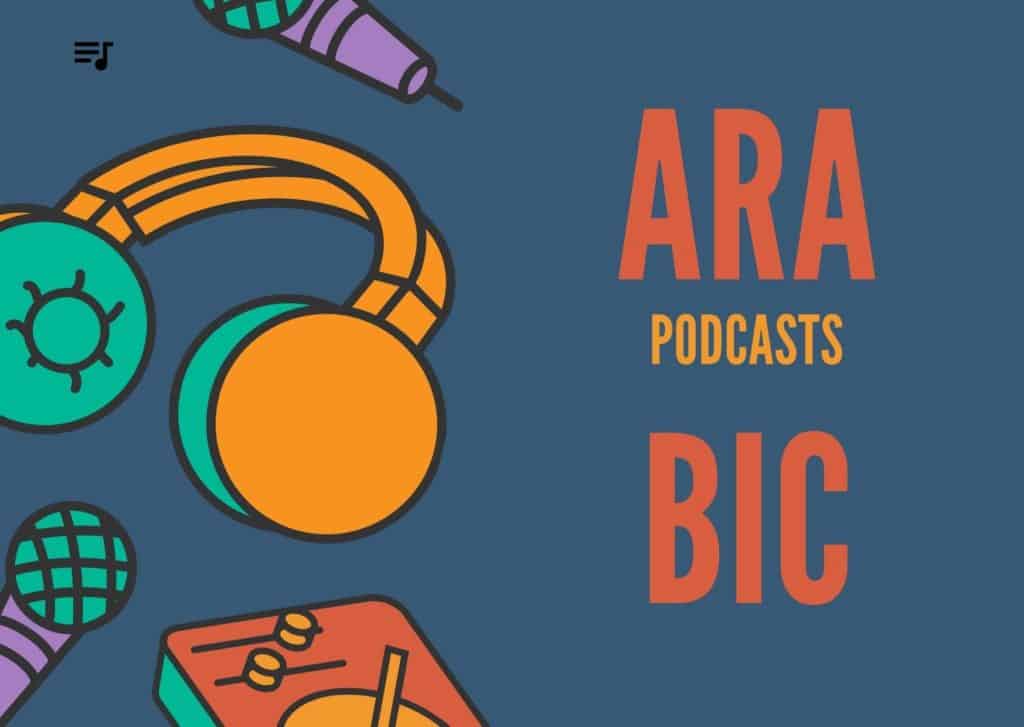Have you ever wondered what is the fastest way to learn Arabic or any other foreign language? If so, you know that it’s difficult because it’s simply not practical and unrealistic despite all the lies and promises you see in advertisements.
Learning and maintaining a language is a lifetime journey.
However, it is possible to speed up your learning significantly by following a very strict routine for a defined period of time.

Let me first clarify that I believe in the long-term consistency of learning a language over short-term intensity, as Bruce Lee had put it. This simply means that it’s more effective to learn the language in bite-size sessions everyday than to do one or two long sessions a week.
But let us all be realistic. Life throws at you all sorts of challenges. Sometimes you may have to cram or learn as much Arabic as you can to prepare for a job interview or an upcoming trip overseas.
If you’re looking to boost your Arabic in a short period to meet a short-term goal, the best method to ensure you make it happen is to follow the steps below.
Table of Contents
A Few Caveats:
There are a few things you should know before you implement this routine to avoid unpleasant surprises, frustration and burnouts that could cause setbacks in your learning journey.
- This plan is very intense and cannot be sustained over a long period of time. It’s designed to be implemented during a period no longer than thirty or forty days.
- It is designed for a learner who wants to improve speaking, reading, writing and listening skills through an emulated immersion. To ensure it meets your own Arabic learning needs, you can eliminate or skip the skill that you don’t need, except for the steps about Arabic reading and listening.
For instance, if you believe you don’t need Arabic speaking or writing skills, you can skip step four or five , as long as you use that time slot to strengthen the other Arabic skill you are more interested in.
- This routine is designed for those who want to learn Modern Standard Arabic, which is more demanding than a dialect. The resources in this routine revolve around MSA practice, not the dialect(s).
How To Learn Arabic Fast or Faster?
1- Set a goal and commit to it.
- Establish a goal and steps to reach it.
You have to be clear and concise. For instance, by the end of this month I want to improve my Arabic speaking ability to that of a beginning intermediate. I want to be able to speak about myself , my interests, and my family with a native speaker.
Then, you clearly establish what you will do to reach that goal. The steps will be exactly what will be detailed in steps two through six below.
- You will write on a piece of paper your 30-day objective clearly and precisely and you will write down your commitment to follow it through. You are basically signing a contract with yourself whereby you hold yourself accountable for reaching your objective. Place it somewhere where you can see it daily (your bedroom, your fridge, desk etc)
Now, just like you hold yourself accountable in front of your employer or school, treat yourself with the same respect and seriousness. By staying disciplined and committed to learn the language you are basically taking care of, and investing in, yourself for the future.
Remind yourself of this truth as you tackle the remaining steps.
2- Surround yourself with Arabic.
As we all know , the best way to learn a foreign language is through full immersion. Assuming you don’t live in an Arab country, you will have to create a little world around you where you are surrounded by Arabic language.
- Add the Arabic keyboard on your devices.
You want to have immediate access to your Arabic keyboard to perform quick online search, write your text messages and emails or simply to type up a short paragraph.
Refer to this detailed tutorial to add the Arabic keyboard to your device(s).
- Change the settings on your phone and computer to Arabic.
The most frequent interaction everyone of us has is with our phones and other electronic devices. This will force you to read, interpret and think in Arabic dozens of times daily. This will be annoying and inconvenient during the first few days before it becomes a second habit.
If it is a drastic change for you and a major convenience, start doing it towards the end of the day and gradually increase it until you have it all day.
Just by doing this, you will learn tons of words that directly pertain to your daily life(time, dates, months etc.)
Take a look at the picture below and see the list of very familiar names in your native language. Now imagine how many new words and phrases you can learn just by changing your language settings on your phone to Arabic.
This holds true regardless of Arabic proficiency level.
3- Listen to MSA on a daily basis.
Make sure you spend at least one hour listening to authentic MSA content daily. It can be a podcast, a YouTube video or radio stream, etc..
To maximize your learning from this daily listening routine, you want to make sure you select MSA audio content that is at your level or slightly above it.
A good measure of at-level-content is if you can understand about 75% to 80% of it. Anything less than that means it is still above your level.
The idea is that you should use your knowledge of 75% – 80% to figure out the remaining content that you don’t understand. Use the context, key words, and sometimes your own knowledge to make an educated guess as to what unfamiliar words mean.
This content interpretation method is more efficient, more reliable and less uninterruptive than memorization, dictionaries or asking others.
Your daily exposure to Arabic listening material for 30 consecutive days will also train your ear (brain) to identify phonetic patterns, speech intonation and parts of speech and convert what used to sound as gibberish in a foreign language into words with meaning.
It is also important to be intentional in what you select to listen to. Make sure the content is of interest to you. It could be related to what you do for a living, your favorite hobby or topics you’d like to learn to talk about and need to improve your vocabulary in.
This will make this listening task feel less like a chore and more like a fun activity of personal meaning to you.
This listening activity is relatively easier to incorporate in your daily routine than other types. You can listen on your daily commute, during a workout , a walk or lunch or dinner.
Listening to Arabic input will teach the correct pronunciation, inflection and vocabulary. These are all prerequisites to improve your Arabic speaking skills.
4- Read MSA content every day.
Make sure you read between 10 pages to 15 pages everyday.
In parallel with the listening routine, daily reading practice will help tremendously with expanding your vocabulary, improving your spelling and consequently with improving your writing. Reading practice is closely tied to acquiring writing skills.
For tips on improving your Arabic reading , including reading resources, you can read this post.
You should find the time to read between 10 and 15 pages of Arabic content. This could be daily news, fiction, children stories, magazines etc..
Just like with the listening materials, make sure you read content that is relevant to you and on par with your reading level.
The rule of thumb is that you should be able to understand 75 to 80 percent and use context and your inference to understand the remaining 20 to 25 %.
For reading resources, you can visit news sites like Asharq Alawsat, Radio Sawa and Aljazeera to read non-fiction content suitable for intermediate to advanced students.
For non-fiction, Hindawi platform boasts a free collection of fiction and non-fiction Arabic books, including translated literature classics, children stories, science and business publications.
This wide array of options will help you find content pertinent to your interests and professional field and suitable to your level whether you are a beginning intermediate or advanced learner.
Many children and youth stories writings have harakat, also known as tashkeel or vocalisations. The presence of these Arabic short vowels should greatly assist readers not quite comfortable with the vowelless Arabic script.
During your daily routine, try to note interesting and functional Arabic phrases and expressions that you can use in your writing exercises.
5- Practice your Arabic writing.
Again, you want to commit to a daily routine of writing in Arabic to hone your writing skills. Your task is to write three different things throughout the day.
Writings should consist of emails, text messages, social media postings or comments and one journal entry at the end of your day.
Writing an email or a text message will help you learn the skill of casual social communication in Arabic. A social media posting or comment provides the opportunity to express an opinion about a specific topic or to show appreciation for information provided.
On the other hand, a journal entry is different. You will have to narrate a series of events explaining what you did for the day. This of course will be in the past tense.
Make sure as you write to respect the grammar and spelling rules and to recollect a few phrases and expressions you learned from your daily readings.
The combination of these three simple writing exercises every day for a month will boost your writing skills and cover different communication functions.
Consequently, you will gain real writing practice that emulates your writing needs in real life.
6- Practice your Arabic speaking.
For speaking and writing skills, it will depend on whether they fit in your Arabic learning goals. Some learners only care about reading and listening comprehension, while others are interested in developing all Arabic skills.
Some learners care more about reading and speaking only.
Speaking practice will be the most difficult to complete without a conversation partner, especially if you are studying on your own or live in an area with few to zero Arabic speakers.
However, in the age of the internet, nothing is impossible. You can find a native tutor/conversation partner on an affordable online platform like iTalki . Use their native speaker tutors at the rate you are most comfortable with and work on achieving your Arabic speaking goals. The trick here to maximize your Arabic conversation practice during your session with the tutor so that you can practice the skill, get corrected on your mistakes and guided on the proper pronunciation.
You can also join a local Meetup Arabic conversation group on meetup.com or simply check the bulletin board in your local public library.
Whichever venue you decide to use make sure you practice your Arabic oral skills at least twice a week.
Choose topics that you care about, are pertinent to you and at your speaking level. If you are a beginner, speak about yourself, describe your house, family and neighborhood and talk about your daily routine.
If you are an advanced beginner, talk about your city, your childhood, problems in your city and your job.
If you happen to be an intermediate level, bring up topics about social issues, the news and politics, and so on and so forth.
Speak slowly and clearly and mimic intonation and inflections used by the native speakers you interact with or listen to.
7- Finally, the long run.
If you have trained for the Marathon or half marathon, you must be familiar with the long run session. This sixth and final step in this challenge for faster learning of Arabic is very much similar to the long run routine.
Without digressing, in this step you will have to allocate 2 hours of relaxed exposure to Arabic on your day off or or spread over the weekend at a rate of one hour each day.
The point of this “long run” is that after a week of short and intense sessions of reading, writing, listening and speaking, you want to use this time to continue your exposure to Arabic input but at a relaxed pace.
Make no mistake that despite this relaxed day, you’ll continue to overwhelm your brain and senses with Arabic input and exercises.
Some experts suggest that for optimum results, it is recommended you conduct your listening sessions during a workout, a jog or a brisk walk because the brain can retain more information during exercises due to high levels of oxygen.
Conclusion:
Personal development is the belief that you are worth the effort, time and energy needed to develop yourself.
Denis Waitley
As you’ve seen above, this is an intense challenge that is very difficult for many learners to follow. And it’s OK , because it is not for everyone . Actually, it is not recommended as a sustainable long-term approach to learning Arabic.
Yet, we don’t live in a perfect world. As mentioned above, some learners need to take exceptional measures to meet some short-term goal of theirs. It could be preparing for a job interview, a proficiency exam or an upcoming business or pleasure trip to the Arab world.
As you can see from the recommended routines, they try to emulate a real-world scenario where you are surrounded by Arabic and have to listen, speak, read and write.
This will not necessarily make you fluent in Arabic, but this will shave off a few months of normal pace learning.
If you are a beginner, you will jump to advanced beginner or low intermediate. If you are a L1, you will advance to L2 within thirty days, and that’s no easy feat.
Remind yourself of this truth as you tackle the previous steps, when you feel lazy, tired or just not feeling like learning.
The gains you’ll make are worth the short-term pain you will experience as you put yourself into this grueling routine.







